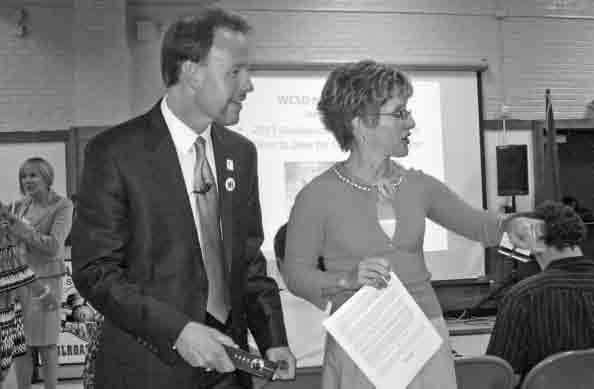
13 minute read
News
from April 26, 2012
Victory over artists
In Las Vegas last week, National Association of Broadcasters president Gordon Smith applauded his organization for killing legislation requiring terrestrial radio stations from having to pay royalties to the performers they use, royalties that the NAB formerly called a tax (“TV ads distort issue,” RN&R, Feb. 25, 2010). The former Oregon U.S. senator said, “When I first arrived at NAB, we were fighting passage of the Performance Rights Act, a bill to levy a fee on local radio that had the momentum of a fast moving freight train. But because of some very smart leaders in both the radio and TV business, NAB was able to thwart this piece of legislation that could have devastated the financial model of free and local radio.” The legislation would have required stations to pay the same royalties that other services, such as Muzak, already pay. Nevada’s U.S. Sen. Harry Reid was instrumental in defeating the royalties. Nate Anderson of the online media magazine Ars Technica wrote, “Radio stations pay only songwriters for the music they play; recording artists get nothing (except publicity).” Two years ago in Las Vegas, performers protested outside the NAB convention with an inflatable pig and signs about “Piggy radio.”
Advertisement
Who’s on first?
The sponsor of an initiative ballot petition that would have protected a mining industry tax loophole while slightly raising mining taxes said last week he is dropping the petition.
Monte Miller, a conservative Las Vegas investor and advisor to Jim Gibbons when Gibbons was governor, also dropped a petition that if enacted would have increased the state gambling tax to 9 percent—still one of the lowest in the nation.
Miller has been gaming the initiative process in an effort to block a broad business tax. When Nevada AFL/CIO said it would launch an initiative petition to accomplish it, Miller retaliated with his counterpetitions. He now says he doesn’t think the union federation can accomplish it, leading him to drop his petitions. Earlier this month a state court judge ruled that his gambling tax petition was misleading and Miller had said then he would start over with a new petition.
Nevada AFL/CIO leader Danny Thompson said his group’s petition will go forward.
Also at play in this dance is a legislative proposal, Senate Joint Resolution 15, which would remove the mining tax loophole from the Nevada Constitution. Mining is the only industry that has its own tax break enshrined in the constitution.
Clara Bow back in theaters
A newly restored version of the silent movie Wings, first to win the Academy Award for best picture, will be shown at the Century Sparks theater on May 2. The movie stars Clara Bow, once a resident of Nevada who was married to the state’s lieutenant governor.
Wings, a 1927 film about World War One pilots, was an innovative mess. It included a crazy-quilt of techniques including widescreen portions, two types of color tinting and synchronized sound in some prints. Contrary to legend, Bow is not seen nude. There is a scene in which she is surprised by soldiers entering a room while she is dressing, but nothing vital is revealed. On the other hand, there is some male nudity seen—but only from the back. In 1931, Bow married actor Rex Bell in Las Vegas. When their film careers faded and Bow experienced mental problems, they spent more time in Nevada on a ranch outside Searchlight, the future home of another Nevada lieutenant governor, Harry CLARA BOW IN WINGS Reid. Bell ran for office a number of times— for Clark County commissioner, the U.S. House, lieutenant governor and governor. He was elected to two terms as lieutenant governor in the 1950s and was running for governor in 1962 when he died.
They were married until his death but effectively led separate lives in the later years of the marriage.
Schools of hard knocks
Education in Nevada limps along
Washoe schools superintendent Heath Morrison worked with casino executive Michonne Ascuaga at a Sparks High School ceremony.
Instability has long been one of Nevada’s enemies. People come, people go. The by pride of place that generates support
Dennis Myers for the state is lacking where only one in five residents is a native. Then there is the instability within its force of public administrators. Agency directors come and go, too, depriving the agencies they lead of institutional memory and a sense of what, in Nevada’s culture, works and doesn’t work. The past week has been a wash. The Nevada Board of Regents decided to keep acting University of Nevada, Reno president Marc Johnson on permanently, while Washoe County schools superintendent Heath Morrison decided to leave the state. Teachers, and particularly counThe Washoe County School District is seeking information selors, are fond of the quote from Robert Browning: “Ah, but a man’s on what changes, reach should exceed his grasp/Or if any, should be what’s a heaven for?” The verse plays made in the school environment. More information can a role in the memorable teacher’s novel Up the Down Staircase. be found at Nevada is in no danger of reaching www.washoecounty beyond its grasp. The state’s economic schools.org/ development plan envisions 50,000students/student -climate-survey new jobs—about a third of the number it has lost during its long recession. State government’s ability to get even those 50,000 jobs is uncertain. Even education is an essential component in luring new business to the state, and between government cuts and inflation, the state’s commitment to education has been in decline for half a decade. In 2009, higher education funding in the state after more than two years of recession was $683 million. Today, it’s $473 million. At the elementary and secondary levels, Morrison told the RN&R last year that Nevada is far below the norm:
“At this point ... the per-pupil in the proposed budget goes to about half the national average. The national average is about [$]10,000 per pupil, and the proposed budget is about $4,900. So a lot of extras that many other states
have in terms of electives, and really engaging programs that really get kids excited about staying in school, we’ve never had or we’ve already cut. And so you reach into it until you can’t cut any. And you can’t cut math, you can’t cut science, so what you do is you end up having to add students in those classes, so instead of having 31, 32 kids in the class, you have 36 or 37.”
The per-pupil money has risen a bit since then, but the national average is still in no danger from Nevada.
Eugene Paslov Education consultant
Lower higher education
The White House this week said Nevada has 26,815 people using the Federal Guaranteed Student Loan program. It was part of President Obama’s sales pitch for getting Congress to act to prevent higher interest on FGSL loans. He said the interest rates “are slated to double from 3.4 percent to 6.8 percent. To out-educate our global competitors and make college more affordable ... And for each year that Congress doesn’t act, students rack up an additional $1,000 in debt over the life of their loans.”
But while the president was doing that, the Associated Press—in an analysis of government numbers—was arguing that the value of a college education is doubtful, at least in the Intermountain West, which the APsaid “was most likely to have young college graduates jobless or underemployed—roughly 3 in 5.”
“You can make more money on average if you go to college, but it’s not true for everybody,” economist Richard Freeman told the AP. It was a message educators in Nevada did not need at this particular moment.
Another unwelcome message came at a meeting of the Nevada Board of Economic Development, where a marketing company told state officials that Nevada has an inferiority complex that can be cured by touting the state more.
Lorna Shepard of Noble Studios told the board members that Nevada’s assets are obscured by a focus on its problems, a notion that surprised some leaders who have tried to get policymakers to focus on state problems.
Shepard said, “There’s a belief there’s not a great education system.”
Rather, she said, there’s a “perception problem” that can be cured by boasting more about the state’s schools.
Educators countered that it’s not a perception problem, it’s a real problem. “It is not a great education system,” said consultant and columnist Eugene Paslov, former Nevada superintendent of schools. “We’re in the bottom quartile in almost every measure, and we haven’t moved much in the past decade or two.”
Some of the officials in front of Shepard immediately responded with plenty of touting, bragging about how great Nevada is and challenging the whole notion that the state has an inferiority complex.
Touting is a marketing technique, not an actual governing action, and in any event it’s never been something that is lacking in the state. Nevada leaders are loaded with swagger. “[O]ur economy is robust, our workforce is teeming, our job growth is healthy and the unemployment rate is low,” said Gov. Jim Gibbons during the first year of the recession as he called for halving state higher education funding, reducing the state’s ability to compete for new business.
Welcome to Nevada
Morrison’s departure will remove one local target from the poisonous public dialogue that today’s politics generates. While Morrison was generally admired, he did have his critics, with some arguing that the higher graduation rate he posted—70 percent—was actually a product of a change in the system for calculating the rate. Sparks Tribune columnist Andrew Barbano wrote Sunday that even Morrison’s reach was not exceeding his grasp. “Morrison’s goal for year three [of the school district strategic plan] is 1 percent. Uno. Asingle point. A71 percent graduation rate. So says NevadaReportCard.com, the Nevada Department of Education website. … By his own admission, his purported progress will prove unsustainable.”
But other criticisms were less reasoned, to the point that this newspaper removed some vitriolic reader comments about Morrison because they could have been legally actionable. Even comments that fell short of that point were harsh.
Bonnie Wilson: “HOWCAN THIS BE that Washoe County Schools Superintendent Heath Morrison received in 2010 some $280,000 of TAX dollars for this job?!?!?!?! ... FIVE teachers we need desperately IN the classroom have NO job because Washoe County Schools Superintendent Heath Morrison stole and continues to steal THEIR paychecks.”
Matt Ong: “Greed, which these sacrilegious pay raises are, decreasing your staff’s salaries, and the profane obesity of so many of our elected public officials and appointed public employees, are the mortal sin of taking more than your fair share because they break God’s Law.”
Wilson and Ong as least signed their messages. From behind the safety of a pseudonym, “iJoe” bewailed—without any evidence— “crimes involving moral turpitude here by Washoe County Superintendent Heath Morrison.”
That should make it easier to attract applicants to replace Morrison.
“The next Washoe County school superintendent will be tarred, feathered and crucified,” Barbano wrote. Ω
Improvements

A worker smoothed the rough surface of the Sparks municipal parking garage floor to get it ready for additional work, one step in renovations being made between now and May that include pavement reconditioning and drainage improvement. The garage is still in use by the public, though only on the ground floor where 40 spaces are available. The entrance will temporarily be on Ninth Street.
County to city
Kitty Jung wants to bring her Washoe County experience to Reno City Hall
Kitty Jung seems pretty bored by comparison politics. With almost six years in policy-making on the Washoe County Commission, including three years each on the Boards of Regional Planning and District Health, she said she already has plenty at stake in the actual politics of Northern Nevada as she runs for the Reno City Council. “The city of Reno is at an important crossroads in regards to its financial status,” Jung said. “I want to help with my proven track record of having the highest bond rating in Northern Nevada. My strong record of creating jobs through the Regional Jobs Team—with 200 stakeholders who commit their time and expertise to job creation—demonstrates how deep my roots run here.” If elected, she’ll hope that a similarly lengthy background as a member of the Truckee Meadows Flood Authority and the Shared Services Task Force can lend some context to the Council’s upcoming deliberations on flood planning, economic diversification and the everdeepening morass of municipal finance issues. Jung also has a degree in psychology, something that could be useful in running the no-man’s land between county and city trenches over the tendentious fire divorce. Jung was the only county commissioner to vote against breaking up fire services consolidation. The long-time member of the Joint Fire Advisory Board has voted in the past to preserve the district’s contract with the city, though earlier this month she opposed a measure that would have extended talks with the city over fire services. “I have been consistent in my votes to continue consolidation,” Jung said. “The vote you reference also included a demand of services at a set price by the county that I knew would only worsen the negotiations.” Jung was appointed to the county commission by Gov. Jim Gibbons on August 29, 2007 to fill out an unexpired term. In November 2010, she was elected to the commission on her own. Two years later, the sitting commissioner is
making her first run for the city council. So if you’re a District 3 county voter, then Kitty Jung by fights for you. That is, unless or until she’s James DeHaven elected to fight for somebody else in city Ward 5. In a world full of cynics, that would be the knock on the 39-year-old Democrat, one of three candidates up for the seat Councilman Dave Aiazzi leaves this fall. Fortunately for Jung, Truckee Meadows Community College political scientist Fred Lokken is pretty sure we don’t live in that world. “It’s not at all unusual,” Lokken said of Jung’s candidacy. “If she gets elected, she’ll have to give up her county seat, but until then, she has every right to remain as a county commissioner … and the voting public accepts it.” Ambitious, crafty, or whatever else she might be politically, Jung is nothing if not qualified. With four councilmembers term-limited out of their seats—and 26 other largely inexperienced candidates in the primary field—Lokken expects Jung’s candidacy to be a “win-win” for the well-established county commissioner-turned-city council candidate. Jung, for her part, is inclined to agree. “I am the only candidate in this race who understands the issues, and I will fight for the citizens of Reno,” Jung said via email. “I am a zealous advocate for my constituents, and I will continue to be.” ACity Council win for Jung would mean filling one vacancy at the city level by creating another on the county board. By law, Gov. Brian Sandoval would have to pick a Democratic appointee to fill Jung’s county commission seat soon after her departure. Leaving an office in the hands of the governor won’t be seen as an ideal outcome to anyone, but the commissioner from District 3 hasn’t seen much cause for concern. “All feedback from [county] District 3 and [city] Ward 5 has been supportive and encouraging,” Jung said. “I have excellent relationships with all electeds in the Truckee Meadows, including the Reno City Council members, and I believe my transition can serve as a peace broker so that we, as electeds, can get to work serving our constituents.” Whatever the outcomes in June and November, Jung is confident the record she’s put together as a commissioner has won over plenty of hearts and minds in District 3. When it comes to Ward 5, she’ll just have to wait, hopeful that some of that hard-earned goodwill resonates with voters in her somewhat changed district. While she anticipates that opponents will try to question her allegiances, Jung doubts that holding on to her county seat looks like a calculated political hedge to her constituents. In addition, there is overlap between Jung’s county district and her city ward. The two jurisdictions share 12 precincts containing 7,008 voters. Besides, she said, “Reno citizens are Washoe County citizens.” Ω

PHOTO/JAMES DEHAVEN
Kitty Jung chats with some Native American performers at an Earth Day event.








